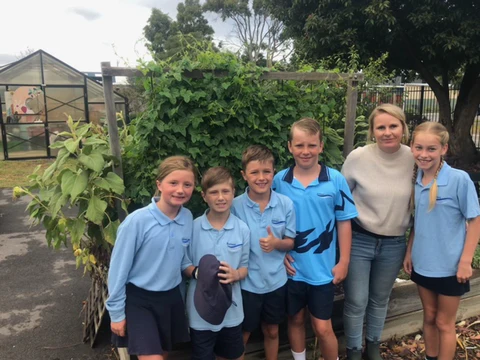Sharing the joy of growing vegetables with children is a hands-on experience that promotes sustainable learning. To better understand the benefits and how to implement gardens in schools, we chatted with winner of Good & Fugly’s recent competition: The Hunt for Australia’s Fugliest Fruit or Veg.
Amy Dowling is the Market Manager of Bonbeach Farm Markets, and part of the duo who began the much-loved veggie garden at Bonbeach PS Garden. Established in 2013, Amy, a parent at the school, began by weeding out the existing garden beds and planting several quick growing vegetables. The aim was to entertain and inspire the students. And that’s where it all began. Amy is now teaching sustainability at Bonbeach PS Garden, managing the garden and working with many dedicated students to maintain it.
Amy, what was the reaction of the students when the school garden began?
The popping of one pea pod opened a whole new world by connecting the students with nature and embracing what it has to offer. One student's comment, "peas come from the freezer" was the realisation that we needed to keep going. This got us thinking about the importance of creating an edible garden and incorporating sustainable education into the curriculum. Slowly, the garden transformed and grew. There was no funding for any of the work. Local businesses were approached to help get the vision off the ground and amazingly they donated seeds, compost, worm farms and tools.
What value do you think the students have gained from the garden?
A community garden offers a sense of belonging. Students lead the way in shaping their garden. It’s a learning garden filled with an organic fruit orchard, native plantings, a chicken coop, a worm farm, a mini food forest, a frog bog, nature play areas and vegetable beds. The students find their own interests within the garden program, from seed saving, planting, watering, weeding, raking, composting, bug hunting, digging, cooking, or simply sharing and connecting with peers. Kids who are working in the garden, learning about nutrition, composting, lifecycles etc, and just generally enjoy being a part of the school garden. They also tend to go home and influence their families! I think the long-lasting benefits of a school garden are obvious, it's not just growing food, but the students grow too.
On top of the sustainable learning outcomes, it offers a place of creativity and play. One student made a mud pie which then inspired a “bakery” – so many more mud pies can be made! That was then followed with a recycled timber mud kitchen. Bug hotels are forever appearing, fairy gardens come and go, logs are moved and shifted to create spaces, compost is collected from classrooms, tepees are built, frog bogs are nurtured, and flower gardens are grown to stimulate all senses, plus our seasonal crops are always tended to. The garden will continue to grow and change as the years go on, and the students will shape it just by playing in it.
Was it hard to motivate the students initially?
Children love the outdoors and exploring. Sometimes, they just need to be presented with the option. When we created a lunchtime garden club, over half the entire school was attending! The interest was huge, so it was then that we decided to incorporate the garden club into the science curriculum. My role began as a volunteer position and is now a paid role with classes taught one day a week and another day or two a week spent maintaining the gardens.
What’s your best advice for other schools wanting to start a veggie garden?
I am continually asked by other schools how and where to start. Start small and grow from there. Create a fundraiser, ask for donations, enter competitions, apply for grants, have a working bee! Once you start, as we say, "build it, and they will come!" It just becomes addictive.
What’s the best part of the garden?
We do have some amazing highlights, which include winning the Victorian school garden awards in 2017, Dinner with Costa at Grow it Local, (we won growers of the year), being featured in Angus Stewart's book "Grow your own" and a visit to the school garden from Dirtgirl Worlds "Scrapboy" (we won school composters of the year). All these achievements reflect the hard work and success of the garden program, but by far, the very best thing is seeing children connect with nature and enjoy it.
Thanks for sharing, Amy!



